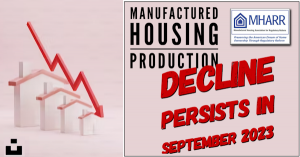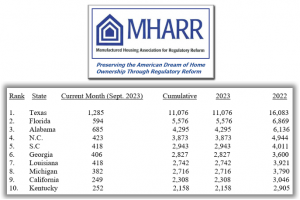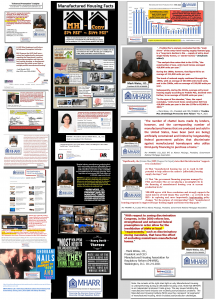Manufactured Housing Production Decline Persists in September 2023 per Manufactured Housing Association for Regulatory Reform (MHARR).
During Affordable Housing Crisis Affordable Manufactured Housing Continues to Underperform, by Long-term Historic and Year over Year Trends, says MHARR.
— Mark Weiss, J.D., President and CEO of MHARR.
WASHINGTON, D.C., U.S.A., November 3, 2023 /EINPresswire.com/ — The Manufactured Housing Association for Regulatory Reform (MHARR) reports that according to official statistics compiled on behalf of the U.S. Department of Housing and Urban Development (HUD), HUD Code manufactured housing industry year-over-year production declined again in September 2023. Just-released statistics indicate that HUD Code manufacturers produced 7,955 new homes in September 2023, a 15.2% decrease from the 9,381 new HUD Code homes produced in September 2022. Cumulative production for 2023 is now 66,647 homes, a 25.7% decrease from the 89,812 homes produced over the same period during 2022.
A further analysis of the official industry statistics shows that the top ten shipment states from January 2023 — with monthly, cumulative, current year (2023) and prior year (2022) shipments per category as indicated — are (see top ten states graphic).
The statistics for September 2023 produce one change from last month, moving Louisiana into 7th place, ahead of Michigan.
Again, as it has for months now, inherently affordable manufactured housing continues to significantly underperform, with production levels for 2023 remaining far below the industry’s potential and even the diminished annual production averages of the past decade-plus. Reversing this trend will require a laser-like focus and concrete remedial action to combat the discriminatory zoning exclusion and concurrent failure of Fannie Mae and Freddie Mac to implement the Duty to Serve (DTS) mandate with respect to the 80% of the mainstream manufactured housing consumer finance market represented by personal property loans, which have – and continue to – undermine the manufactured housing market.
The Manufactured Housing Association for Regulatory Reform is a Washington, D.C.- based national trade association representing the views and interests of independent producers of federally-regulated manufactured housing.
— 30 –
MHARR Manufactured Housing Production Statistics
The Manufactured Housing Association for Regulatory Reform (MHARR) is the only U.S. trade association serving the manufactured housing industry’s producers which publishes years of monthly statistical reports with a focused analysis. That information is available to the public, investors, public officials, media, educators, nonprofits, affordable housing advocates and others at the link below. The full MHARR statement for the November 3rd, 2023 release of September 2023 data is included below, as are the items quoted from the October 2023 data.
https://manufacturedhousingassociationregulatoryreform.org/category/manufactured-home-shipments/
Per MHARR on October 5, 2023: “HUD Code manufactured housing industry year-over-year production declined again in August 2023. Just-released statistics indicate that HUD Code manufacturers produced 8,670 new homes in August 2023, a 19.1% decrease from the 10,722 new HUD Code homes produced in August 2022. Cumulative production for 2023 is now 58,692 homes, a 27% decrease from the 80,431 homes produced over the same period during 2022.”
So, production in September declined both year-over-year and month-over-month.
The Manufactured Housing Institute (MHI) has acknowledged this sharp and sustained production decline now in its 11th month.
Mobile and Manufactured Home Living News (MHLivingNews.com) and Manufactured Home Pro News (MHProNews.com) both provided the Congressional transcript of the testimony of Cavco Industries (CVCO) William “Bill” Boor to a U.S. House subcommittee on behalf of MHI that also indicates the decline in shipments.
Boor said in part: “Rather than artificially making it more difficult for us to produce quality, affordable housing we believe there are things that Congress and federal agencies can do to facilitate the availability of manufactured housing.”
Boor told Congress the following:
“The manufactured housing industry is at a critical crossroads due to regulatory barriers and market forces. Cumulative shipments from January 1 through April 30, 2023, decreased by 30 percent compared to the same time period of 2022. April 2023 shipments were down 34 percent compared to April 2022 shipments.”
“Across the country, there are countless state and local zoning, planning, and development restrictions that either severely limit or outright prohibit the placement of a manufactured home.”
“HUD has the statutory authority to prevent local jurisdictions from excluding manufactured homes through the “Manufactured Housing Improvement Act of 2000,” which specifically states that when HUD construction and safety standards are in effect, a locality does not have authority to establish different standards. The statute explicitly states that this preemption should be “broadly and liberally construed” to avoid disparate local requirements. HUD has the authority and duty to pursue more vigorous enforcement of this provision, which clearly establishes federal supremacy for manufactured housing construction.”
That from Boor to Congress is arguably a mirror of years of remarks by MHARR leaders on the subject of a lack of enforcement of the “enhanced preemption” under the “Manufactured Housing Improvement Act” of 2000.
Additional Media Updates from MHARR
From the recent report linked below, MHARR said the following.
MHARR ADDRESSES STATE ASSOCIATIONS ON INDUSTRY DECLINE
At a recent meeting of manufactured housing industry state association executives, MHARR addressed developing industry issues in Washington, D.C., as well as the major causes suppressing long-term industry growth and underlying the double-digit manufactured housing production decline of the past year.
“The enhanced federal preemption provision of the 2000 Reform Law gave HUD the authority to federally preempt any state or local “requirement” that impairs the utilization of federally-regulated manufactured housing.
Exclusionary zoning mandates around the country (in addition to the ongoing failure to fully implement the Duty to Serve mandate) continue to suppress the utilization of affordable manufactured homes at a time when housing costs and monthly mortgage payments are at an all-time high…The enhanced federal preemption provision of the 2000 Reform Law gave HUD the authority to federally preempt any state or local “requirement” that impairs the utilization of federally-regulated manufactured housing. Key congressional proponents of the 2000 Reform Law wrote HUD in 2003 to leave no doubt that the “combined changes [to the law] have given HUD the legal authority to preempt local requirements or restrictions.”
The rest of the Washington Update includes the DOE energy issue, the chassis issue, and financing issues.
About MHARR
Q&As with MHProNews with Danny Ghorbani
MHARR Issues and Perspectives – Mark Weiss
https://manufacturedhousingassociationregulatoryreform.org/category/mharr-issues-and-perspectives/
MHARR-History
MHARR on Proposed MH-Chassis Legislation
Mark Weiss, J.D., President & CEO
Manufactured Housing Association for Regulatory Reform
+1 202-783-4087
email us here
Visit us on social media:
Facebook
Twitter
LinkedIn
YouTube
Other
![]()
Originally published at https://www.einpresswire.com/article/666135930/manufactured-housing-production-decline-persists-in-september-2023-per-manufactured-housing-association-11-3-2023-data




